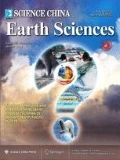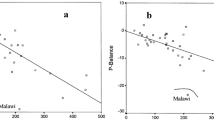Abstract
Because of the complexity of social responses to climate change, as well as limitations of proxy data concerning interactions between climate change and human responses, the social impacts of past climate change and associated response mechanisms, thus, require further investigation. To shed light on the transmission of climate change impacts within historical Chinese society, we selected 30-year resolution sequences of temperature anomalies in eastern China and 10-year resolution sequences of grain harvest grades, famine indices, and frequencies of peasant uprisings in China over the past 2000 years. Using a food security perspective, we analyzed the impacts of temperature changes historically transmitted through Chinese production, population, and social subsystems, and differences in transmission characteristics between cold and warm units. Our results were as follows. (1) From 210 BC to 1910 AD, temperature changes in China were significantly positively correlated with grain harvest grades (correlation coefficient, 0.338), and significantly negatively correlated with famine indices, and frequencies of peasant uprisings (correlation coefficients, −0.301 and −0.277, respectively).The correlation coefficients between famine indices and grain harvest grades or frequencies of peasant uprisings were very low. (2) There was a higher proportion of bumper or normal harvests (86.5% of the total decades), more moderate and mild famines (76%), and a lower proportion of peasant uprisings (33.3%) in the 30-year warm units. Conversely, there was a higher proportion of poor or normal harvests (70.7%), a greater proportion of moderate and severe famines (77.6%), and more peasant uprisings (51.7%) in the 30-year cold units. (3) Of the 23 main transmission pathways extending from temperature change to the social subsystem, 13 occurred in cold units, of which 7 had an endpoint of peasant uprisings, and 10 occurred in warm units of which 3 had an endpoint of peasant uprisings. The main transmission pathways that were more likely to be associated with the impacts of temperature change were: Cold → poor harvests → severe famines → more uprisings; cold → poor harvests → moderate famines → more uprisings; warm → bumper harvests → mild famines → no uprisings; warm → bumper harvests → moderate harvests → no uprisings; warm → normal harvests → mild famines → no uprisings; and warm → normal harvests → moderate famines → no uprisings. (4) The transmission of the impacts of temperature change was a complex process. Within this process, famine was most prone to being modulated by human society. In the transmission pathways from the production to the social subsystem, there was a stepwise decrease in the occurrence rate of decades that were probably affected by climate change. In all cold units, 10.4% of decades ending in more uprisings were most likely to be associated with the impacts of temperature change. In all warm units, 47.9% of decades ending in no uprisings were most likely to be associated with the impacts of temperature change. This research can contribute a better understanding on the past interaction mechanisms and processes within the human-climate-ecosystem complex, as well as a better response to the impacts of the ongoing climate change.
Similar content being viewed by others
References
Bai S Y. 1982. General History of China (in Chinese). Shanghai: Shanghai People’s Publishing House
Büntgen U, Tegel W, Nicolussi K, et al. 2011. 2500 years of Europe climate variability and human susceptibility. Science, 331: 578–582
Chu K C. 1973. The preliminary research on climate change in China of past five thousand years (in Chinese). Sci China Ser A, 2: 15–38
Costanza R, Graumlich L, Steffen W, et al. 2007. Sustainability or collapse: What can we learn from integrating the history of humans and the rest of nature? AMBIO, 36: 522–527
Editorial Committee of the Institute of History of the Chinese Academy of Social Sciences. 1988. Compilation of Natural Disasters and Agricultural Policies in Dynastic China (in Chinese). Beijing: Agriculture Press
Fang X Q, Xiao L B, Wei Z D. 2013. Social impacts of the climatic shift around the turn of the 19th century on the North China Plain. Sci China Earth Sci, 56: 1044–1058
Fang X Q, Zheng J Y, Ge Q S. 2014a. Historical climate change impact-response processes under the framework of food security in China (in Chinese). Sci Geogr Sin, 34: 1291–1298
Fang X Q, Su Y, Yin J, et al. 2014b. Methodology for quantifying social and economic series on the base of Semantic Differential to serve the research on impacts of climate change (in Chinese). Quat Sci, 34: 1204–1214
Ge Q S, Zheng J Y, Fang X Q, et al. 2003. Winter half year temperature reconstruction for the middle and lower reaches of the Yellow River and Yangtze River, China, during the past 2000 years. Holocene, 13: 933–940
Ge Q S. 2011. Climate Change in Chinese Dynasties (in Chinese). Beijing: Science Press
Ge Q S, Liu H L, Zheng J Y, et al. 2013. The climate change and social development over the last two millennia in China (in Chinese). Chin J Nat, 35: 9–21
Ge Q X, Fang X Q, Zheng J Y. 2014. Learning from the historical impacts of climatic change in China (in Chinese). Adv Earth Sci, 29: 23–29
IHOPE. 2010. Developing an Integrated History and Future of People on Earth (IHOPE). Research Plan. IGBP Report No. 59. 1–40
Lamb H H. 1995. Climate, History and Modern World. 2nd ed. London: Routledge
Lee H, Zhang D, Fok L. 2009. Temperature, aridity thresholds, and population growth dynamics in China over the last millennium. Clim Res, 39: 131–147
Lee H, Zhang D. 2013. A ttale of two population crises in recent Chinese history. Clim Change, 116: 285–308
Li B C. 1982. An investigation of formation of paddy-wheat-cropping in the Yangtze River Basin in Tang dynasty (in Chinese). Agric Archaeol, 2: 65–72
Medina-Elizalde M, Rohling E J. 2012. Collapse of classic Maya civilization related to modest reduction in precipitation. Science, 335: 956–959
Nunn P, Hunter-Anderson R, Carson M, et al. 2007. Times of plenty, times of less: Last-millennium societal disruption in the Pacific basin. Human Ecol, 35: 385–401
Pederson N, Hessl A E, Baatarbileg N, et al. 2014. Pluvials, droughts, the Mongol Empire, and modern Mongolia. Proc Natl Acad Sci USA, 111: 4375–4379
Su Y, Fang X Q, Yin J. 2014. Impact of climate change on fluctuations of grain harvests in China from the Western Han Dynasty to the Five Dynasties (206 BC-960 AD). Sci China Earth Sci, 57: 1701–1712
Wei Z D, Fang X Q, Su Y, et al. 2014. A review of climatic impacts on Chinese socio-economic development over the past 2000 years (in Chinese). Adv Earth Sci, 29: 336–343
Weiss H, Bradley R S. 2001. What drives societal collapse? Science, 291: 988
Xiao L B, Huang H, Wei Z D. 2012. Comparison of governmental relief food scheduling and social consequences during droughts of 1743–1744 AD and 1876-1878 AD in North China (in Chinese). J Catastrophol, 27: 101–106
Xiao L B, Fang X Q, Zhang Y J, et al. 2014. Multi-stage evolution of social response to flood/drought in the north China plain during 1644-1911. Region Environ Change, 14: 583–595
Xu J L, An P Q. 2004. The Twenty-Four Histories (in Chinese). Shanghai: Chinese Dictionary Press
Yin J, Su Y, Fang X Q. 2014. Relationship between climate change and grain harvest fluctuation in China during 210 BC to 1910 AD. Quat Int, doi: 10.1016/j.quaint.2014.09.037
Yuan Z L. 2008. History of Chinese Disasters (in Chinese). Zhengzhou: Zhengzhou University Press
Zhang D, Jim C, Lin C, et al. 2005. Climate change, social unrest and dynastic transition in ancient China. Chin Sci Bull, 50: 137–144
Zhang D, Lee H, Wang C, et al. 2011. The causality analysis of climate change and large-scale human crisis. Proc Natl Acad Sci USA, 108: 17296–17301
Zhang S L, Zheng X J. 1983. Chinese Peasant Revolutionary Struggle History (in Chinese). Beijing: Qiushi Press
Zhao E X, Ke S W. 1977. The Draft of the Qing History (in Chinese). Beijing: Zhonghua Book Company
Zheng J Y, Wang W C, Ge Q S, et al. 2006. Precipitation variability and extreme events in eastern China during the past 1500 years. Terr Atmos Ocean Sci, 17: 579–592
Zheng J Y, Xiao L B, Fang X Q, et al. 2014. How climate change impacted the collapse of the Ming Dynasty. Clim Change, 127: 169–182
Author information
Authors and Affiliations
Corresponding author
Rights and permissions
About this article
Cite this article
Fang, X., Su, Y., Yin, J. et al. Transmission of climate change impacts from temperature change to grain harvests, famines and peasant uprisings in the historical China. Sci. China Earth Sci. 58, 1427–1439 (2015). https://doi.org/10.1007/s11430-015-5075-9
Received:
Accepted:
Published:
Issue Date:
DOI: https://doi.org/10.1007/s11430-015-5075-9




